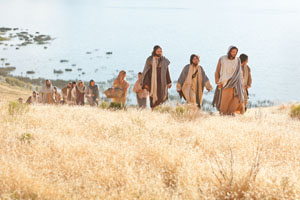Recently, a Christian brother published a “sympathetic critique” of Darrow’s book Discipling Nations. He raised issues about Disciple Nations Alliance teaching that have been noted by others from time to time. Because of that, and in the spirit of a free exchange of ideas, we offer here, in six parts, our brother’s critique and Darrow’s response. editor
While many Christians affirm Miller’s important stress upon ideas and the repudiation of the sacred-secular division, as well as the need to influence societies with the biblical worldview (I certainly do!), his eschatology is problematic. These statements are most revealing:
Our job is to help people see the big picture of what God is doing in history to restore the world, end hunger, and build his kingdom (117).
We are to tend the garden, build the city, fill the earth with the knowledge of the Lord, and bless and disciple all the nations (137).
The task given to the church in the Great Commission was nothing less than to disciple nations. If the church does not disciple the nation, the nation will disciple the church (192).
Note the close parallel between God’s covenant with Abram to be a blessing to all the nations (see Genesis 12:1–3) and the Great Commission of the Church by Christ to make disciples of all the nations (see Matthew 28:18–20) (225).
And why is the blessing to be extended to all nations? Why are we to disciple nations? So that when the King returns, the glory of the nations will be brought by the kings of the nations into the City of God (263).
Man is to participate in and help hasten God’s unfolding consummation of history…the transformation completed. And the blessing of the nations fully extended – this is our telos (277).
On that day, with the discipling of the nations complete, the kings of the earth will bring the glory of the nations to the Lamb—our King, Jesus Christ (see Revelation 21:24–26). Until that ultimate day, we all have work to do! (279)
~
We now come to what you describe as my “serious conceptual flaw.” As you point out, this is best defined as an eschatological matter.
You point out that “In this present epoch, the ideal state will not be achieved ….” You might be surprised that I agree with you that the ideal state will not be achieved this side of Christ’s return.
 We are in the time of the “now” and the “not yet.” As you so aptly put it, the current status is a “messy, complex world ‘under the sun.’” The final restoration of all things will not take place this side of Christ’s return. But how are we to live our lives? We are to live the “now” in the context of the “not yet.” The context of our lives is not the pursuit of ever more consumption as the moderns would argue. It is not the disappearance of the individual into a spiritual never-never land as the postmoderns and Eastern religions would argue. No, the context of our lives is first, the death and resurrection of Jesus Christ, HE CONQUERED DEATH, and we no longer need to live in the fear of death, and second, His certain return at the end of time to consummate history with the coming of the fullness of the kingdom of God.
We are in the time of the “now” and the “not yet.” As you so aptly put it, the current status is a “messy, complex world ‘under the sun.’” The final restoration of all things will not take place this side of Christ’s return. But how are we to live our lives? We are to live the “now” in the context of the “not yet.” The context of our lives is not the pursuit of ever more consumption as the moderns would argue. It is not the disappearance of the individual into a spiritual never-never land as the postmoderns and Eastern religions would argue. No, the context of our lives is first, the death and resurrection of Jesus Christ, HE CONQUERED DEATH, and we no longer need to live in the fear of death, and second, His certain return at the end of time to consummate history with the coming of the fullness of the kingdom of God.
In the time between Christ’s first and second coming we are to seek substantial healing in all of our relationships. We are to live in light of these key events of history. We are to live the proleptic life, to live in the reality of the future, today. In other words, we are to live as if the future were present. We are to live in the world we now see, according to what we know is true in the unseen world, our lives revealing in the now, the not yet of the coming of the kingdom of God.
Miller seemingly fails to discern deeply the two “commissions” (the cultural mandate, Genesis 1:26-28, and the Great Commission, Matthew 28:19) in light of our messy, complex world “under the sun” (Eccl 1:9) and in the “present evil age” (Gal 1:4). In this present epoch, the ideal state will never be achieved through any ideology or worldview: communism or socialism, democracy, capitalism or consumerism, Islam or any of the myriad alternative spiritualities. Never will there be a true “Holy (fill in the blank) Empire.”
~
I would argue that while the First (cultural) Commission given in Genesis 1 has been impacted by the fall, it has not been rescinded. The job description of Genesis 1 and 2 is still our first and current job description. Carrying out the first job description on this side of the cross is really what it means for the church to be salt and light in the broken world, what it means to think biblically in their family life and vocation, and that is what it means to disciple nations.
Miller appears to embrace an overly optimistic, post-millennial, triumphal outlook that envisions progressive, Christian cultural development and dominance of the world in preparation for the Lord’s return. According to Miller’s vision, the church should be centrally involved in nation-building. Interestingly, the one culture that appears to best fulfill his “development ethic” is North America, for he declares, “democratic capitalism is significantly better than any other system” (Kindle edition). (See more nuanced comments in the 2nd edition: 119, 138-139, 158.) As Cunningham said regarding Miller’s vision: “discipling the nations” is “the key to solving the world’s problems” [emphasis mine]. Miller said we “build the city of God” [emphasis mine].
~
There is a yes and no response to this. I can be as discouraged and depressed as anyone about the brokenness of our world. Having spent 30 years traveling in the world of hunger and poverty and more recently watching the moral and spiritual collapse of my own country, I am deeply troubled. But at the same time, I am highly optimistic because I know who won the battle of the cross and I know with certainty that Christ will return with His kingdom.
While I believe progress can be made in the material world, this side of Christ’s return I am not a triumphalist. I would describe myself as an optimistic realist. While I affirm that Christ expects us to manifest His kingdom coming and His will being done on earth as it is in heaven, this leads to development but not “dominance of the world.”

Christ’s parable of the wheat and the weeds is instructive at this point. The wheat and the weeds grow up concurrently, side by side in the same field. They will be separated at the time of the harvest fulfillment. In the meantime, the kingdom of light and the kingdom of darkness are growing simultaneously, more and more.
You may read me as postmillennial, but that is not how I would describe myself. In fact, since the endless argument experienced in seminary over the millennial question, I have not used any of these terms. Perhaps it was the theologian, Dr. James Hurley, whom I met at L’Abri that helped me the most. Jim identified himself as “pro-mil.”
Some who hear me think that I must be advocating a Christian theocracy. Discipling nations doesn’t mean Christians seizing political power and imposing Christianity through government force. To the contrary, this is the exact opposite of what a biblical worldview supports. The Bible is all about liberty and freedom. The freedom to choose God, or to choose hell. A biblically-informed approach to government and politics establishes that freedom. This is why I have argued that the framework of a biblical worldview leads to free societies where people govern themselves internally. The more that people exercise self-government, the freer the society and the more limited the government. If people do not self-govern, there will be anarchy or tyranny. In fact, it is the non-pluralistic faith of Judeo-Christian theism that leads to pluralistic societies. All other faiths, including secularism, will move in the direction of “theocracy” or tyranny. Again, for more on this see the book Emancipating the World.
It seems, therefore, that Christians construct the church, so that it can build the nation and develop culture, and thereby resolve the world’s problems – all of this to prepare the earth for the Lord’s return. However, solving, for example, my country’s many social-political-economic problems and building the local branch of the City of God imposes an onerous burden upon the local church.
~
Brother, I beg to differ with you. As I travel around the world, including to your country, I find many pastors and Christians are dissatisfied with the state of the church and what they expect of the Christian life. Many people have asked me, “Isn’t there more to what it means to be the church, to be a Christian?” I would say that the social-political-economic problems of your country are the church’s problems.
One well-known example of this kind of thinking is Tim Keller’s Redeemer Church in New York City. Their vision statement reads, “As a church of Jesus Christ, Redeemer exists to help build a great city for all people through a movement of the gospel that brings personal conversion, community formation, social justice, and cultural renewal to New York City and, through it, the world.”
My colleague Dwight Vogt has written a helpful paper on this subject, The Unique Role of the Local Church in Developing a Flourishing Community.
As I have argued previously, the cross of Christ has both personal and public application. There is a parallel between the individual process of salvation (justification, sanctification, and glorification) and the social/global process of Kingdom advance (the cross, the great commission and discipling of nations, and consummation).
Both applications are, in a sense, three-step processes. Both flow out of Christ’s finished work on the cross and His defeat of Satan. The first (individual) makes possible the second (social/global). In both cases, the middle piece (personal sanctification and the public discipling of nations) is a messy process of victories and failures, advances and backsliding, ups and downs, wheat and weeds, living as new creations in a still fallen and enemy occupied world, etc. But both processes move in a definite direction. Christ promises that in both cases, he will bring to completion the work he has begun. That applies both to us as individuals (teleios, being perfect and complete, lacking in nothing) and to the world as a whole (the telos with the coming of the fullness of the kingdom of God to a perfect completion).
 After all, the Great Commission is a CO-mission. We are called to engage WITH Jesus (He is leading) in the process of discipling the nations, with the full knowledge that there will be no perfectly discipled nations until Christ returns. We are to be discipled ourselves, and disciple others with the full knowledge that glorification won’t happen on this side of Christ’s return.
After all, the Great Commission is a CO-mission. We are called to engage WITH Jesus (He is leading) in the process of discipling the nations, with the full knowledge that there will be no perfectly discipled nations until Christ returns. We are to be discipled ourselves, and disciple others with the full knowledge that glorification won’t happen on this side of Christ’s return.
As I often point out, some person, power or ideology is always at work to disciple the world. The entertainment community has powerfully discipled the West. The media is discipling nations. The digital/video industry is making disciples of our young people. Every Christian and every church bemoans these effects on society. Is it so inconceivable that Jesus Christ has sent His church into the world to disciple it according to His kingdom priorities? Is this not indeed the essence of the Great Commission?
Again, brother, thank you for taking the time to read Discipling Nations and to write this sympathetic critique. Thank you for the opportunity to comment on your critique. My sense is we have more in common than we have disagreements. May the Lord bless you and your ministry. Hopefully we can spend some time together when I am next in your country.
- Darrow Miller






